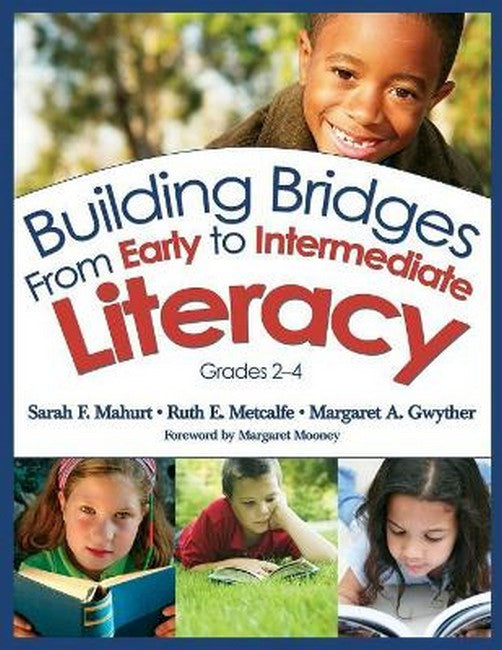Sarah F. Mahurt is the director of the Purdue Literacy Collaborative and associate professor of literacy and language at Purdue. Through her leadership, the Purdue Literacy Collaborative has trained more than 80 literacy coordinators to be literacy leaders and coaches in their schools. This project has reached more than 800 teachers who are improving their teaching of literacy and student achievement in literacy. She recently received the Department of Curriculum and Instruction's Engagement Award for this school reform effort. Mahurt's publications include articles on the integration of reading and writing, teacher development, and Caribbean children's literature. She has also made numerous presentations on literacy teaching and learning in elementary schools and school reform in literacy education. She has consulted with schools and districts focusing on school improving student achievement in reading and writing. She recently chaired a committee to develop a statewide network of educators in Indiana who are focused on improving writing instruction. In more than 25 years as an educator, Mahurt has worked as a classroom teacher, reading specialist, and university professor. She was awarded the Celebrate Literacy Award from the St. Croix Chapter of the International Reading Association and the Alpha Kappa Alpha Outstanding Educator Award for her literacy work in St. Croix, Virgin Islands. She was also received the Teaching Excellence Award at the University of the Virgin Islands. Ruth Metcalfe has been a literacy coordinator and teacher for Goshen Community Schools in Goshen, Indiana. She has a masters degree in elementary education and she completed a year-long course to become a literacy coordinator. During her 16 years as an educator, she has taught first, second, and fourth grades and provided professional development and coaching at the building level. She is currently released from teaching to work full time with all first and second year primary teachers and provide support to other primary literacy coordinators throughout the district. In addition to her work as a teacher and staff developer, Ruth has been literacy consultant for elementary schools. She has presented at national conferences with a focus on reading and writing in second grade as a transition to the intermediate grades. She has also presented at state conferences on comprehension and language development. Ruth completed action research in her own classroom to determine how what she learned impacted her practice. She also researched the impact of Literacy Collaborative on first graders in her school, looking at English language learners and children who were new to the school. Ruth infuses her classroom with joyful and powerful teaching. She also enjoys working with teachers on how theory looks when put into practice in the classroom - the place where theory and practice meet. She is passionate about literacy, children, teaching and learning. Margaret Ann Gwyther is a national literacy consultant and coach. She facilitates adult learning through ongoing professional development and coaching. She has been a keynote presenter at local, state, regional, national, and international conferences focusing on literacy, Reading Recovery, and distance delivery technology and consults with universities, schools, and school districts throughout the country to provide ongoing assistance in improving literacy instruction and children's learning. She spent eight years training coaches through Literacy Collaborative at the Ohio State University and Purdue University. Margaret's wide-range of experiences in teaching, coaching, and education administration are the basis for her intense interest in children's literacy and their learning as well as the professional development of teachers. She has been an elementary teacher, a middle school and high school athletic coach, a high school activity director and vice principal, a Reading Recovery teacher leader as well as a professional development director. Margaret has traveled extensively leading students on athletic tours and teachers on education tours in various foreign countries. She established the Alaska Distance Delivery pilot project in collaboration with the Ohio State University for training Reading Recovery teachers in villages and communities across the state and above the Arctic Circle. These experiences provide a strong base for understanding how schools work, the development of teachers, and children's learning.
Request Academic Copy
Please copy the ISBN for submitting review copy form
Description
List of Figures Foreword Preface Acknowledgments About the Authors 1. Introduction Teaching for Independence Teaching for Strategic Action Struggling Readers and English Language Learners How Children Grow as Readers and Writers Literacy Instruction During Transition Reflection 2. Assessment Getting Started Word Study Reading Writing Anecdotal Notes Running Records Conference Notes Using Assessment Finding Time Reflection 3. Word Study Learning About Words Phonological and Phonemic Awareness Phonics Structural Analysis High-Frequency Words Vocabulary Word Walls and Charts Linking to the Real Work of Reading and Writing Reflection 4. Reading Getting to Know a Reader in Transition Developing Stamina Changes in Work Stations Gradually Decreasing Small-Group Guided Reading Using Reading Mini Lessons Teaching Children How to Choose Books Literature Circles Strengthening Comprehension Shared Reading for Comprehension and Fluency Shifting Responses to Text Writing More Developed Responses to Reading Sharing Time Reflections 5. Writing Making Instructional Decisions Modeled Writing Shared Writing Interactive Writing Writing Workshop Mini Lessons Independent Writing and Conferring Sharing Reflection 6. Pulling It All Together Integrating Within the Language Arts Integrating Language Arts With Science and Social Studies Planning the Nonfiction Project Preparing for the Nonfiction Project Literacy Lessons on Nonfiction Reflection Afterword References Index

